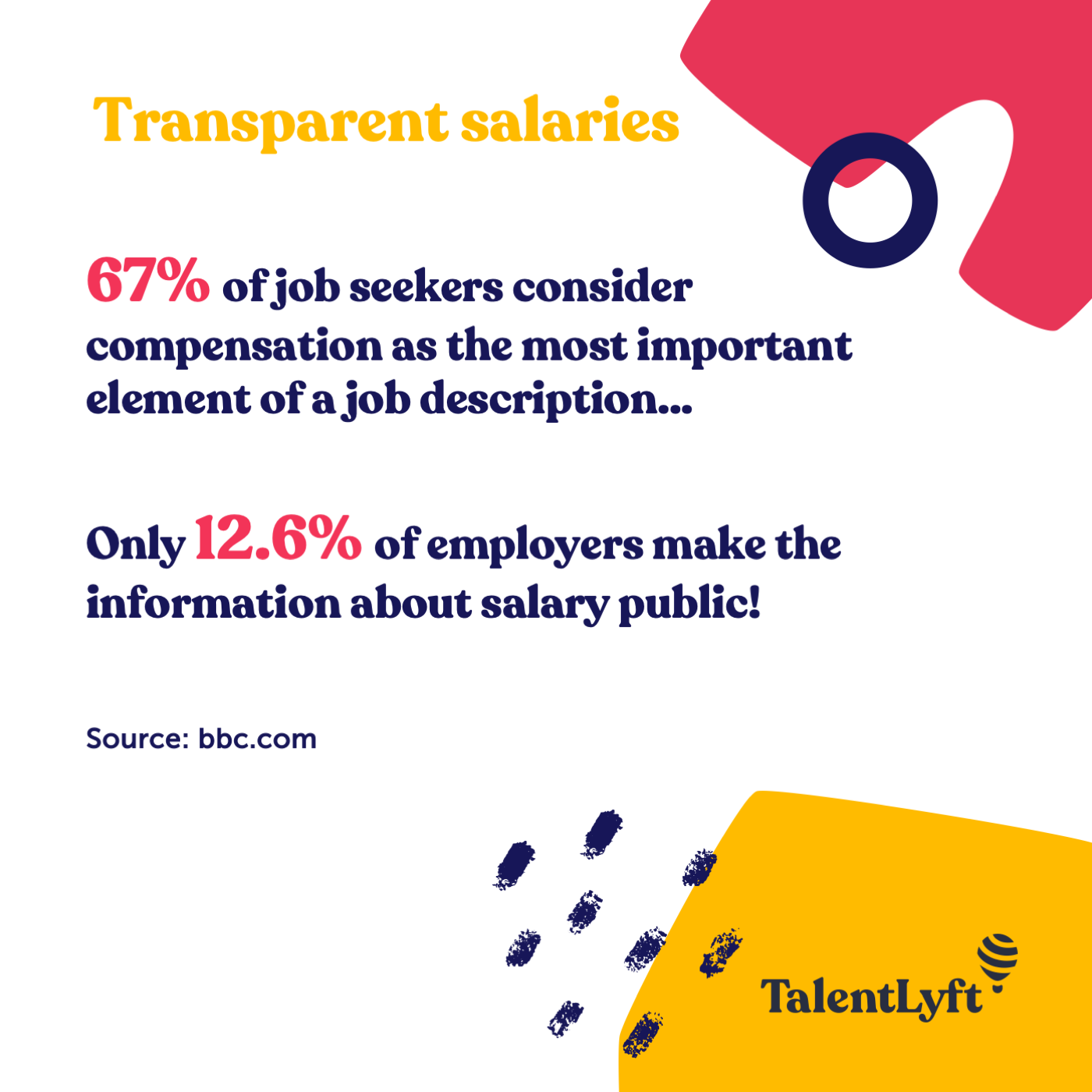![https://adoptostaging.blob.core.windows.net/article/dHsscSyHSEClPRRGk7aSXA.png]()
As recent research from reed.co.uk showcased, the roles with displayed expected salary receive 43% more applications than those without! Other research confirms that salary transparency creates more gender and racial equality in the workplace.
So, why are so many companies still dread disclosing their employees' salaries? And, more importantly, why should more companies make an effort to uncover their wages to attract more relevant candidates?
That is why we decided to write an article explaining why companies should consider being more transparent when communicating their employees' salaries to attract more qualified talent.
Salary transparency attracting qualified candidates
Knowing what to expect from the employer from the first moment the candidate decides to apply for a position at a company positively reflects the company image and the candidates' commitment levels. More specifically, here is a list of positive outcomes you can count on when introducing transparency in salaries:
Attracting more candidates to apply
Attracting a better culture fit candidates
Closing pay gaps & decreasing inequality
Improving retention
Building a recognizable employer brand
Attracting more candidates to apply
As we already mentioned in the introduction, the research has shown that job posts containing salary ranges increase the number of applicants. More specifically, such job posts attract 43% more applicants than posts without mentioning salary. Furthermore, 67% of job seekers consider compensation as the most important element of a job description while only 12.6% of employers make that information public!
And, even though attracting large numbers of candidates isn't always an indicator that you attracted the right candidates when it comes to disclosing salary this is the case. Here is why - by determining the level of salary upfront, you are also specifying a seniority level of the role, which gives candidates a sense of whether they are qualified for the position or not.
Since role names differ quite a lot from company to company and there is no standardized way of naming different roles, it is often difficult to determine the actual seniority of the position. However, even when companies write down the expected level of experience required for the role, additional salary information could increase the chances of attracting suitable candidates.

Attracting a better culture fit candidates
One of the most essential benefits of salary transparency is attracting a better culture fit candidates. What do we mean by that? Salary transparency is not just about knowing how much an employee is compensated for their work. It is also about the culture you are creating by being upfront with such - usually the most mysterious information at the company.
While some companies have contracts stating that employees shouldn't discuss their salaries with others, such a shift in the mindset sets the ground for a culture of transparency. And candidates who look for such an environment will be drawn to apply for the position. Besides knowing what they can expect from you as an employer from day one, they know what it will take to get rewarded and promoted and how much that will reflect on their compensation. Ultimately, only the people who cherish such an approach will decide to join your company.
Looking to attract more relevant candidates to join your company?
Build a recognizable branded career site with TalentLyft and communicate your company values to all potential candidates!
See how you can build a career site
Closing pay gaps & decreasing inequality
Most companies keep being so mysterious about their salaries because it is so typical that two people performing the same job at the same company get different compensation. There are two groups of problems causing the discrepancy in salaries:
Different negotiation skills
Racial and gender inequality
Different negotiation skills
Everyone poses different negotiation skills, from each employee to the employer. Sometimes we have the case of a desperate employer willing to pay extra for an additional team member on one side and a long-term employee fearing to ask for a raise on the other. On top of it, if the employer fosters a culture where employees are discouraged from discussing salaries, this can create inequality among employees.
But it's a tricky road to choose. In the highly candidate-driven market, we are in today, most employees look back at their salaries after experiencing dissatisfaction at work. It becomes a matter of time when they start commenting on them. Ultimately, it becomes evident that wages are determined by one's ability to negotiate in such an environment - seems unfair, doesn't it?
Racial and gender inequality
A second primary reason for pay gaps and inequality is one that marginalized groups have been fighting for ages and still don't seem to win over. And that is gender and racial inequality. For example, research from 2021 suggests that women make 0.82$ for every dollar a man makes. And the situation is even worse when it comes to different races. Ultimately, salary transparency fights racial or gender-related inequality as it looks solely into the job requirements and nobody's personal traits.
In both cases mentioned, the employer's reputation and the employee's trust can be entirely diminished if the differences between salaries are high. That is why communicating salaries transparently and creating standardized pay grades for growth make a good case for closing pay gaps and increasing employee equality.
Improving retention
For many employers worldwide fighting to keep their employees who are more than ever keen on switching jobs, we might have some good news!
This is what the Bequom report found:
"More than half (58 % )of employees would consider switching jobs for more pay transparency, and for Gen-Z, this goes up to 70 percent!"
- quite an indicator for companies to focus their strategies on in the upcoming year!
This shouldn't be such a surprise since introducing a more transparent environment makes it easier for employees to see themself evolving in it. Knowing what salary they can have in a year or two if they grow within the company gives everyone a clear sense of direction.
Building a recognizable employer brand
Finally, creating a distinguished company culture will automatically reflect on your employer brand and the way candidates perceive you as an employer. In the case of salary transparency, it would be beneficial to communicate it as a company value on your career site. Additionally, your job posts should reflect the same values and create a truthful image of your company. As we already mentioned, the culture of transparency will ultimately attract those candidates looking to join a company that shares their own values!
Challenges of implementing salary transparency
Despite the multiple benefits associated with creating a salary-transparent working environment, there are still some things to look out for when implementing this new strategy. One obvious challenge is that employees who find the salary too low or get a higher offer will automatically go to the competitors.
However, despite this being a challenge, ultimately, transparency creates higher standards and a fairer market! If we take a second and imagine most companies transparently communicating their salaries, there would possibly be no pay gap, and the wages would only go up - being forced by the competition. So, taking on the risk of being a leader on this and creating a transparent culture with salary transparency may be a winning strategy in the war for talent we are in today!

















